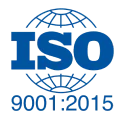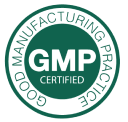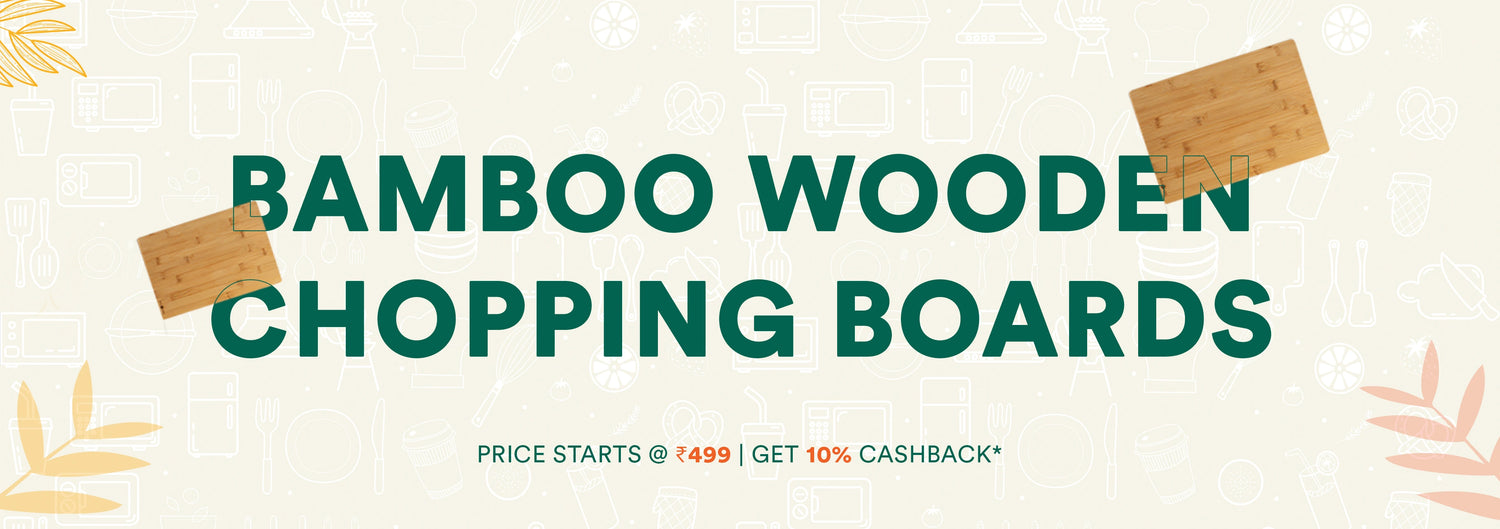Premium Wooden Chopping & Cutting Boards
A chopping or cutting board is not simply a surface for work in the kitchen; it is a partner. A good chef or cook will not treat all cutting boards equally. Out of so many options available in the market, a bamboo chopping board is versatile, aesthetically pleasing, and strong.
Bamboo chopping boards are made from bamboo, which is a fast-growing grass - not a tree. Bamboo chopping boards are incredibly durable, knife-friendly, long-lasting, and good for the planet. Whether you are chopping vegetables, carving roast meat, or simply slicing bread, this chopping board does it all.
Types of Chopping Boards
There are several chopping board options available in the market, which are made from bamboo, plastic, wood, or glass, and provide protection to your knife and the kitchen countertop. Based on a few factors, here are some recommended chopping board options:
1. Bamboo Chopping Board:
Bamboo cutting boards tend to be harder than most types of wooden cutting boards and are, therefore, a durable, lightweight, and eco-friendly option. These boards tend to have antibacterial properties and are generally knife-friendly with very little maintenance.
2. Plastic Chopping Board:
Plastic boards are typically made of polyethylene or polypropylene. Though they are widely available, they are made from non-renewable resources like petroleum, making them a not-so eco-friendly option.
Since these plastic boards are leached with toxins or microplastics, they allow unwanted chemicals to enter your food, which is unsafe. In addition, once the surface of a plastic board is marked up or discolored, it is safe to say it is a home for many bacteria, which ultimately make their way into the food.
3. Wooden Chopping Board:
Wood chopping boards are a comparatively sturdy kitchen option when compared to plastic chopping boards. They require a little more care to protect against moisture damage; however, quality wooden boards develop charm with age and have a rustic, premium feel.
4. Glass Chopping Board Glass
chopping boards are usually made of tempered glass. They are non-porous, easy to clean, stain-resistant, and can be hard on knives.
How to Choose the Right Chopping Board
When selecting a chopping board, you should consider more than convenience — you owe it to yourself, your knives, your food, and the environment to choose the safest option. If you want to be sustainable in the kitchen, it starts with the durability, responsibility, and ease of use of the tools you choose.
Here are some points to consider:
Material
Say no to plastic. While a plastic cutting board may be more readily available than other options, it is quite expensive to the environment. Although most of the plastic waste will remain in landfills and oceans for years, selecting a bamboo chopping board is an eco-friendly option.
Durability and Safety
A good chopping board reduces the possibility of deep knife marks to allow for bacteria to reside. Bamboo chopping boards have natural anti-microbial properties that will not hold on to food stains and smells. Therefore, they are safe and durable for the food.
Knife-Friendly Surface
Glass and marble all look great, but they're harsh on your blades. Bamboo boards have the bonus of being hard to cut, but soft enough to protect knives.
Sizes & Uses
If you're cooking regularly, you're going to want a medium board for vegetable prep, and a bigger board with a juice groove on it for meats. Having multiple cutting boards separates contaminants from your meals - an important factor in maintaining a safe, low-waste kitchen routine.
Eco-friendly Design
Look for boards that are minimally processed, have food-safe finishes, and are sourced sustainably. EcoSoul's boards come in bamboo, which satisfies all these criteria - providing cutting performance without much plastic.
Plastic vs Bamboo Cutting Board
Plastic cutting boards are often cheaper than bamboo cutting boards, which are a smarter option. They are better for your food, better for your health, better for your kitchen, and ultimately better for the planet.
|
Features |
Plastic Cutting Board |
Bamboo Cutting Board |
|
Knife-Friendly |
No |
Yes |
|
Durability |
Prone to Scratched |
Long-Lasting |
|
Hygienic |
Prone to microbes |
Anti-bacterial |
|
Eco-Friendly |
No |
Yes |
|
Aesthetic |
Basic |
Natural & Elegant |
Benefits of Using a Bamboo Cutting Board
Bamboo is more than just another type of cutting board material; it's an upgrade to an eco-friendly choice. Here are a few reasons why bamboo is now becoming the most popular choice among home cooks:
1. Eco-Friendly and Renewable
Bamboo is one of the most sustainable renewable resources on the planet. Bamboo is a grass, and it grows faster than trees; it doesn't need pesticides to grow, and it regrows from its root system whenever it is harvested. By choosing bamboo, you are making an environmentally friendly choice.
2. Antimicrobial Properties
Bamboo has natural antimicrobial compounds, which prevent bacteria from growing on its surface. Therefore, bamboo is safer and cleaner to use than a plastic cutting board.
3. Safe for your Knives
Bamboo’s consistent and smooth surface material keeps your knife’s sharp edge smooth. Bamboo boards have just the right resistance to protect your tools and give you a nice, solid surface to chop on without quickly dulling your blade, something glass or stone cutting boards will do.
4. Stable & Low Maintenance
Bamboo does not cut as easily because it is so dense, which makes it resistant to cuts and stains, and water absorption. Bamboo does not warp as easily as wood, and it does not splinter when used normally.
5. Lightweight & Durable
Even though they feel lightweight, oak boards feel heavy when using them and are very stable when chopping. Bamboo boards feel lighter than most wooden boards. Bamboo boards are just as tough as wood boards.
Aesthetics
In addition to being a great utility, bamboo boards are beautiful. The clean, modern grain style and all-natural color lend themselves to serving cheeses, fruits, and appetizers right at the table. One board, many purposes!
No Toxic Chemicals.
Quality bamboo boards like the EcoSoul ones are constructed using no harmful adhesives or toxic finishes. They're family-safe and eco-safe, and food-safe.
Conclusion
The chopping board you decide on says a lot about your kitchen and your values, too. At EcoSoul, we support tools that do more than just help you complete a job. Our bamboo chopping boards are durable, made with sustainable resources, and skillfully designed to protect your food and respect the environment.
Plastic chopping boards may be widespread, but they can’t be reliable. Not for your health, not for your knives, and not for the earth. Bamboo can be a smarter alternative - a planet-friendlier option. They are cleaner, greener, and supply a sturdier surface for food preparation. Choose bamboo. Choose better.
Find out more about our bamboo products.
FAQ
|
|
You can clean your vegetable chopping board with warm, soapy water and a soft sponge dishwasher. Avoid soaking it or putting it in the dishwasher. To disinfect naturally, wipe it with white vinegar or rub it with lemon and salt, and then dry thoroughly after washing. |
|
|
Yes. Bamboo is a strong, durable, and eco-friendly option. Unlike plastic, it doesn’t release microplastics and develop cuts and scratches where bacteria can hide. It’s also plant-based and safer for the environment. |
|
|
Definitely. Bamboo is one of the most sustainable materials on the planet. It grows quickly, needs no pesticides, and totally decomposes when it’s done. EcoSoul’s boards use responsibly sourced bamboo with no plastics. |
|
|
A medium-sized board is best for a typical kitchen, since it will give you enough room to chop/pile but not be cumbersome. A larger board is useful for cutting meat and preparing larger meals for the family. A smaller board is useful for quick tasks like slicing fruit while eating breakfast or making a sandwich. |
|
|
We offer several types of chopping boards and it's completely your choice which size you want to order. Mentioned below are the dimensions of the Cutting Board:
|
Certified For Your Peace Of Mind
We believe that certifications are vital to transparency and the overall health of our planet. That’s why we always validate our products to ensure that they’re better for people and the environment.
While not every certification is appropriate for every product, we go to the ends of the Earth to attain the right certifications for the right materials — so you can have peace of mind that you’re doing right by the planet.








![Bamboo Cutting Board with Knife Sharpner [13 x 9 inch, Large]](http://ecosoulhome.in/cdn/shop/files/BCB-L.webp?v=1765885902&width=533)